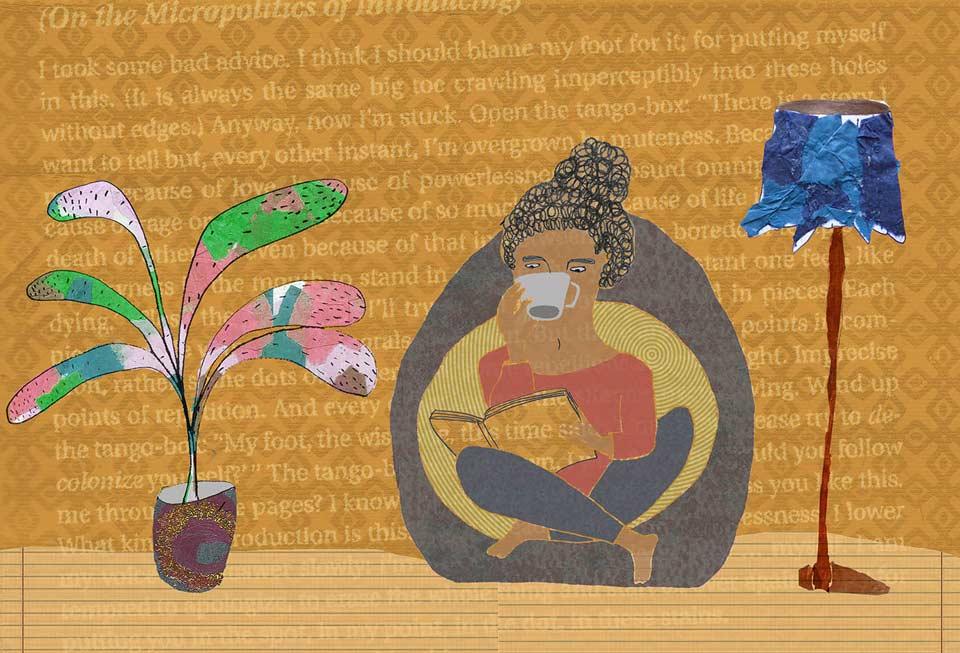
Image description: Collage showing woman sipping drink. Artist: Catalina Alzate
“So do you identify yourself as a feminist researcher or a gender researcher?” I laughed so hard thinking this should not even be a question because that’s the same thing – well that was my position. This question asked three years ago at a Gender and Digital technologies workshop haunted me. It subsequently shaped my becoming a feminist researcher as an individual and within my organisation. Here is a letter to my young self, explaining the infusing of feminist research practices over the last three years.
Dear younger Chenai,
You have identified yourself as a gender researcher. It just makes sense to you because you want to understand the issues impacting both men and women. After all the social construction of these two identities impact the way we experience technology. As a sociologist you have made use of the methodologies given to you but often wondered how to be a better qualitative researcher. You are aware that your approach lacks the nuance of looking at gender as a spectrum, and your fallback has been, that ideally you would like to nuance this but resources, resources, resources. So you trudge on, looking at gender with what you have. These being individual limitations on how to move to a feminist level of understanding.
Then one day, the "funding fairies" interests become piqued by Feminism – a feminist internet, and there is more demand to take this school of thought and apply it to your already existing work. Hang on, you say, have I not already been doing gender/feminism? It turns out you have been straddling lines. Most of your research draws on intersectionality, but there is more that could be done.
Hang on, you say, have I not already been doing gender/feminism?
You have experienced gender research in this way – can our research instruments parse out some gender issues and pick up on gender dynamics in the analysis. Feminist research begins to identify power relations not just amongst the observed, but the researcher as well. I start by unpacking my bias as a researcher, the power and privilege I hold as myself and in comparison to others, how I engage with the research subjects and those who are part of the process and how the work is done.
In an already established institution, these things are there of course – we follow codes of conduct and ethics and meet our aims of influencing policy. So why feminism if all of this exists? Well because as researchers we are holding mirrors to ourselves. And we want to build knowledge from a standpoint perspective – from the perspective of the researched rather than the imposition of categories on them. It becomes a journey of questioning am I able to claim ethical knowing that does not reproduce epistemic violence? Is it enough to state that I am not from my chosen location therefore aware of my outsider self? Do I assume because I am a researcher from the global south researching issues on the global south – power dimensions disappear? Oh, and what of writing to the powers that be that I am doing feminist research? Saying gender seems more palatable to be honest. So many more questions, right? – we did say timing was everything.
Accessing Spaces
Let’s start with power dynamics in accessing space and engaging with established norms of conducting research. My location in this project is that of a global south researcher entering and researching another global south country. There are research licenses required that determine whether you may or may not conduct the research as a foreigner. If you are local, of that country, these would be waived, and one would focus on ethical standards. We often focus on the global north researcher gaze into the global south, but I have been unpacking what it means to be someone based in Africa conducting research in another African country.
Power and credibility that you hold in the network also come into play. Belonging to an established organisation cushions this as the experience is not new and they have built research credibility. Seeking permission is a snowball process of making sure the request lands at the right desk. This is the power dynamic you had not reflected on in your gender work and dismissed it as a systemic. As a feminist researcher, it is important to have an organisation or a network that champions your feminist approach and may help in accessing such spaces. When access is granted – one must think carefully of how they and you relate to certain concepts – do I say feminist research, or do I state what I want to do without stating feminism? If I go for the latter, I must include all the tenets of feminism that I am bringing into this research. Will this suffice? As some say, the jury is out on this - if you do not name what it is you are doing then you are betraying the movement, while for others to not be explicit is a strategy, but the value remains the same.
Consent
What is informed consent? Yes, I can see my younger self saying – But of course, there is consent. Yes, but I argue for now it is necessary to ensure your participants understand what they are signing up for.
That people truly understand what you are aiming to achieve and what are your limitations. Take note of their concerns as well. We oftentimes develop consent forms in languages that are not used in the research sites – this is where we need to ensure translation. Am I boring you yet, younger self? Stay with me. Feminist research really allows for us to put in more of the work in preparing for the research project – when you get to take into account the nuances of the cultural, individual and cultural dynamics of the system we operate in. In your work on gender, these things have been at the back of your mind, and now with these feminist skills they are with you in every single way.
Am I boring you yet, younger self? Stay with me. Feminist research really allows for us to put in more of the work in preparing for the research project
Reflexivity
Access granted to the feminist portal and now the mirror holding is to thyself. I used to hate looking at mirrors but now, lo and behold, I drink from the Kool-aide of feminism so I reflect on myself a lot. Yes, as a gender researcher I have reflected on how the process could have been better, on the resources we need and called out the system – but I have not done that to my own practices as the researcher. The biases I carry and how I engage with what knowledge I’m developing. I start by asking myself why I chose that particular research question – is it curiosity alone, but also I am aware that the data itself is showing us that there is a problem – the gendered digital divide is massive.
But does the community I do research on share my enquiries or questions? In designing projects – I begin to unpack how, with my curiosity, this project will also have value for the research participants – making it a process of co-creation of knowledge. It means that I intentionally shift from making myself the complete knower – coming to extract the juice of your knowledge and applying my own meaning to it. It also means that while my resources may limit me to transform injustices, the knowledge from the research returns to the community as well as policymakers.
In designing projects – I begin to unpack how, with my curiosity, this project will also have value for the research participants – making it a process of co-creation of knowledge.
Breaking mind and body binaries
You must know that all of this is not just an intellectual exercise – it breaks the binary of the mind and the body. There is care and risk involved in the work you do that will impact on you physically and emotionally. This is what makes feminist research an approach that makes you wholly present. You will face challenges around accessing places because you inhabit the physical body of a black young female – your own intersectional experiences. You will get tired in trying to hold the project and wonder if you can SOS a potential burn out or panic attack because all your planned timelines are not coming together. You will have to think of the risk associated with this project – will it leave people more exposed in your quest to understand the digital divide. It is in this approach how you have thought ethical concerns of care and safety for your team, respondents and the overall network itself. Most of all you will even wonder can I write in first person? Is there value in locating my presence within this work where I have previously written from an objective point-of-view as if I am here and the research is there? I phrase this in questions as I realize the answers lie in the process that I am going through.
So, my dear younger self, gender research allowed for you to conduct a purely intellectual exercise that ensured the mind vs body binary. It really has its benefits in grounding the way in which you have done your work. As you have become a feminist researcher – you have become more present and intentional of the way in which you do your work. You enter spaces, declaring your feminism and catch sight of the eyes rolling saying “oh, not those ones”. There is intentionality in your work to not simply take knowledge but learn and apply meaning based on your understanding. You navigate space knowing you have to stop and reflect and your own biases must be checked. You interrogate what it means to enter another’s context and ask – how do you experience life in this digital age? You will also note that not all subscribe to your school of thought and will always question – what makes your approach better.
You have become more present and intentional of the way in which you do your work
I wish you well on your journey of growth to understanding how you evolved from a gender researcher to a feminist researcher. Remember you are navigating and holding space.
Signed your present-day feminist researcher.
- 4364 views






Add new comment